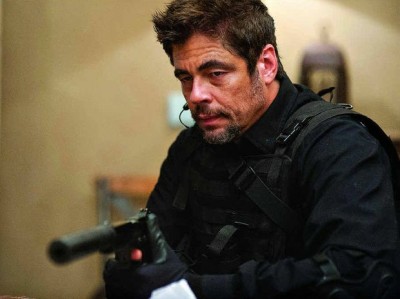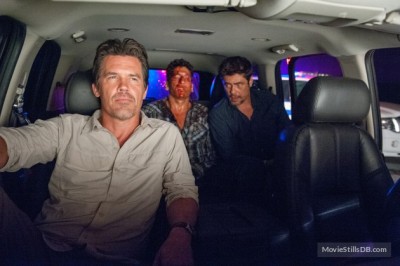This weekend, Denis Villeneuve’s Sicario opens in wide release. Sicario, the film tells us, is the Mexican word for hitman. It also tells us that it was the Hebrew word for the one who hunts the ones who killed us (i.e. Romans – it’s a very old word).
Sicario is a deeply disturbing film about an idealistic FBI agent who leaves her division – which deals with kidnapping and hostages – to volunteer for a joint taskforce that ostensibly is to take down a Mexican cartel.
The film opens with an FBI team storming a home in suburban Arizona in hopes of freeing hostages. We follow the raid via Special Agent Kate Macer (Emily Blunt) – and are just as amazed when the house turns out be virtually empty. Even more amazingly, one the few people in the building opens fire on them. Since there are no hostages, why would he do that?
Because there’s something even more sickening to be discovered – the walls of the house are freshly drywalled and behind the new drywall are literally dozens of dead. It’s more than enough to make even the hardest agent lose their lunch – and Macer and her partner, Reggie Wayne (Daniel Kaluuya), both do exactly that.
Though there’s no tangible evidence, Macer and the team are certain the house is owned by a Mexican drug lord (Raoul Trujillo) so when she’s asked if she would volunteer for an inter-agency taskforce – headed by the very laid back ‘Department of Defence advisor’ Matt Graver (Josh Brolin) – to bring him down, she says yes.
The next thing you know, she’s on a private jet flying to El Paso – with Graver and a sleepy-eyed ‘advisor’ named Alejandro (Benicio Del Toro). What seemed like a pretty straightforward mission turns into something far more complex as Graver’s team makes an incursion into Juarez to bring the drug lord’s brother (Edgar Arreola) back to the U.S. for questioning. Things do not go smoothly.

Sicario was written by Taylor Sheridan (best known for playing Deputy Hale on Sons of Anarchy) and it’s as dark and twisted as they come. It’s also smart and sneaky sly and has moments of humor so dark that the term ‘gallows humor’ doesn’t begin to describe it.
The further we get into Sicario, the darker it becomes – and Macer not only has doubts (she is clearly the eyes of the audience), but tries to act on them before getting shut down by her FBI superior, Dave Jennings (Victor Garber). You don’t take down this kind of criminal with legal means, he seems to be saying – the corruption is too deep.
People don’t come out of a Denis Villeneuve film all happy and smiling – they come out a bit (or a lot) shocked and speaking in hushed tones. He requires his audience to think and Sicario will make people think – some of the things Macer learns from Graver are enough to curdle the blood.
One of the film’s recurring themes is the casual violence that is used by the cartels to enforce their will – forty-two plastic-wrapped bodies in that house; half-a-dozen naked, mutilated bodies hanging from an overpass; the shooting of several would-be ambushers as the team returns from Juarez – and the equally earnest violence used in return by the so-called good guys.
As with the public at large, Macer is kept in the dark about what’s really going on, though she’s a smart woman and figures stuff out as the film progresses. Blunt gets a few opportunities to get into the action and is completely believable (after The Edge of Tomorrow, no one will doubt her ability to handle that sort of thing), but mostly, she’s the remains of the country’s conscience – being appalled by what’s going but not in a position to do anything about it other than just survive.
That there’s more than meets the eye to Alejandro is foreshadowed early on when he tells Macer, ‘Nothing will make sense to your American ears. By the end, you will understand.’ Del Toro makes his ruthlessness seem casual – at least in comparison to the Americans’ more earnest discipline – but when we find out why he’s the way he is, we do, in fact, understand.

Brolin uses his particular gift for making his characters seem at ease in any situation to give Graver a casual veneer that only fades when he’s actively in a firefight. Watching Graver switch from aging hippie mode to efficient warrior, without so much as changing his expression, is impressive – every action he takes has purpose.
Villeneuve has assembled a formidable cast for Sicario and the result is that he doesn’t have to spend any great length of time on unnecessary character beats – his actors do more with looks and actions than there are words to state. As with his past work, Villeneuve never moves the plot along any faster than absolutely necessary – action sequences step up the pace, but everything else is well measured.
The result is a film that has maximum impact and generates conversations about the world we live in, because Sicario may reflect the real world but chances are that, if anything, it underplays it. This is scary stuff and it makes for a bleakly brilliant experience.
When Macer’s idealism is confronted by pragmatism of reality neither side wins – even if the job gets done.
Final Grade: A+
